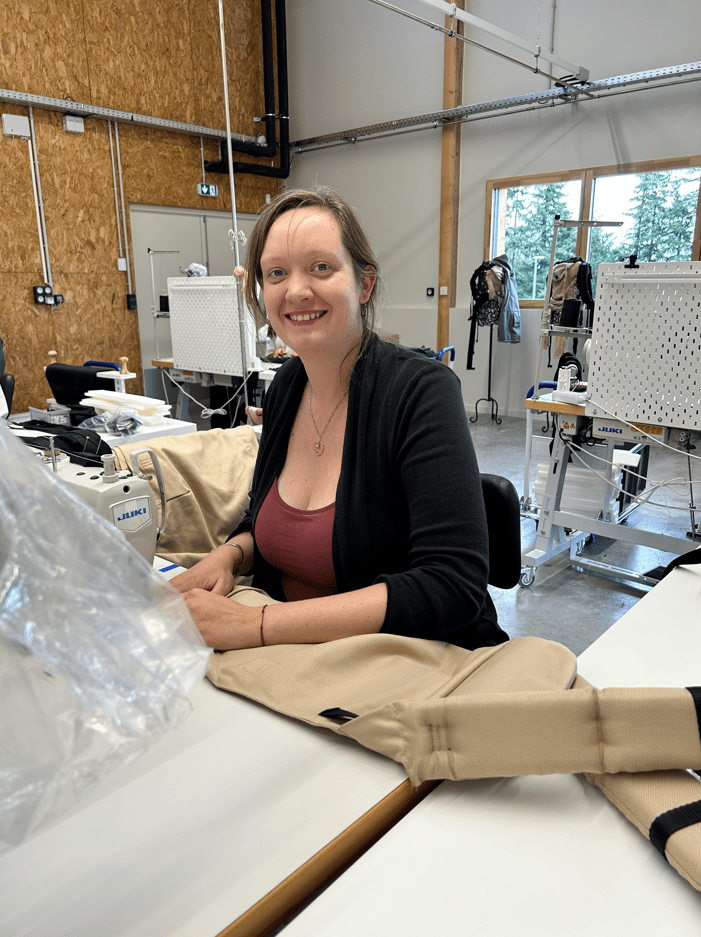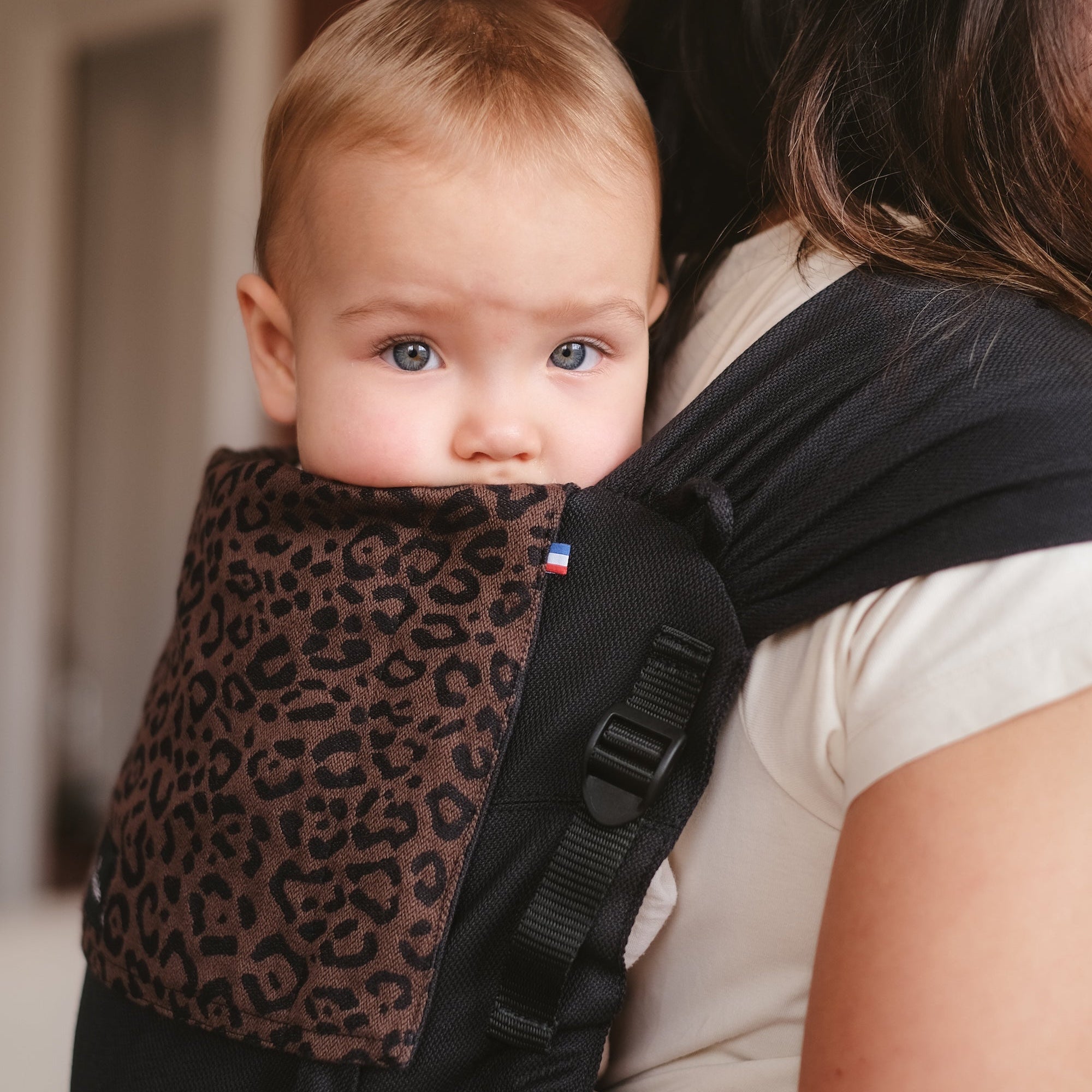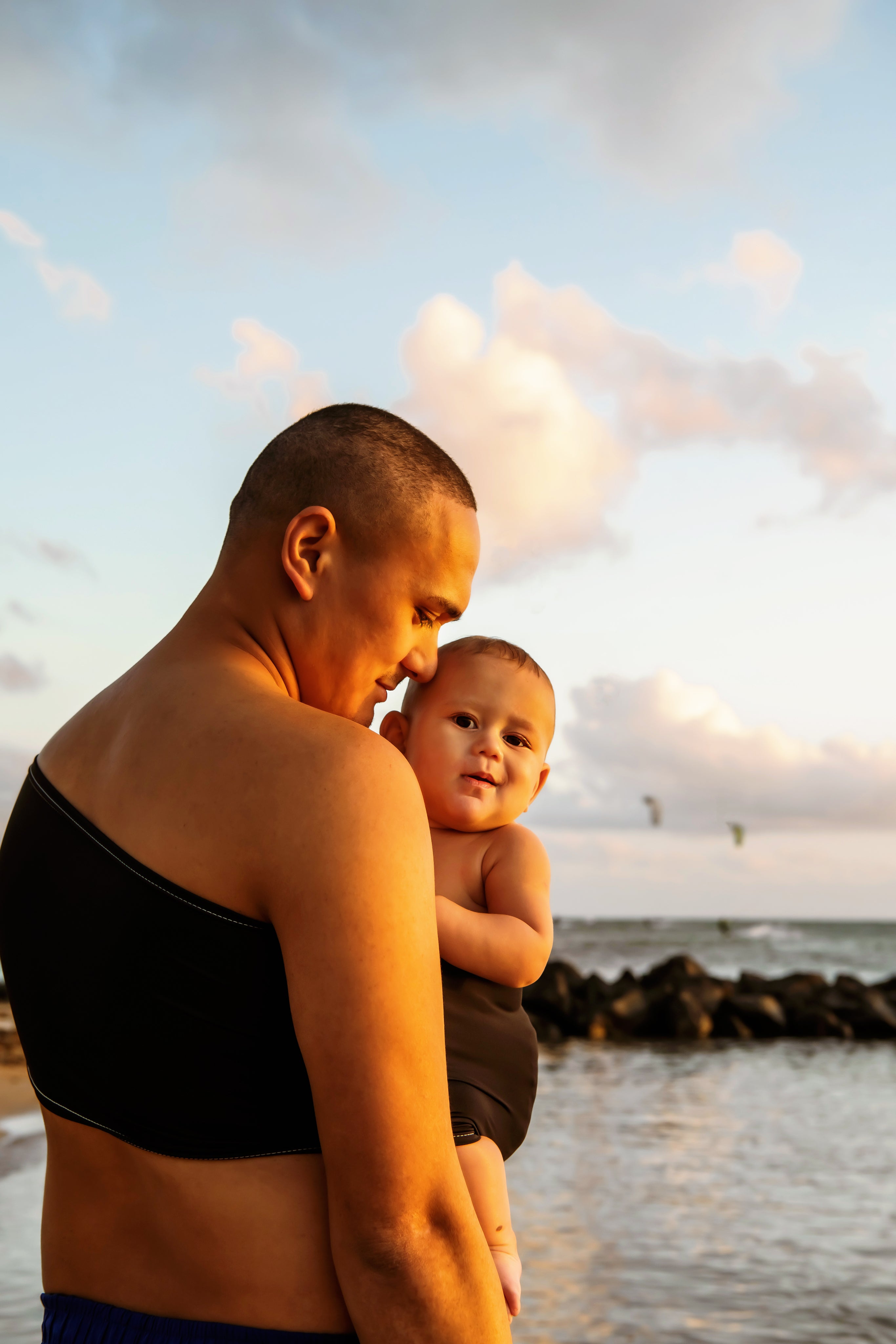
Baby carriers and breastfeeding: all our advice
Is breastfeeding in a baby carrier really possible? The answer is yes, a thousand times yes—and it's actually a valuable practice, both for the baby's well-being and the parent's comfort.

Breastfeeding and working: interview with Camille, a seamstress at Néobulle
During this World Breastfeeding Week 2024, breastfeeding is in the spotlight at Néobulle! We invite you to exchange with Camille, our workshop seamstress but especially a mother of a little Hella, 8 months old.Everyday life, logistics, Camille shares everything about her organization and her experience around breastfeeding and returning to work! Hello Camille! How old is your baby? What is her name? Her name is Hella, she is 8 months old How old was she when you returned to work? I returned to work in September, she was 7 months old.Actually, when I was pregnant, I was working at another company, I requested a parental leave which was refused to me (Note: refusal of parental leave by the employer is illegal, an employee affected by this situation can take legal action at the labor court). Not wanting and lacking the energy to go to conflict, I chose to negotiate a mutual termination. I thus decided to take advantage of my pregnancy and spend time with my daughter during her early months of life. It was also an opportunity to reevaluate my personal and especially professional plans. I attended 3 workshops at Néobulle as a mother and learned about their needs for seamstresses... and that’s how I joined the company in September! How did you decide to continue breastfeeding when you returned? (Naturally? Someone told you? Other?) For me it was natural. I talked about it with a very good friend who had done it. I could not see myself stopping my breastfeeding. I did some research to see how to balance breastfeeding and work. Were you encouraged in this project? I discussed it during my very first interview with Néobulle. There were no problems on this subject and measures were put in place to allow me to express my milk.My close ones, however, supported me a bit less. They questioned how the employer or other colleagues might perceive it (it was not out of malice, but more due to misinformation). The remark "Oh, but you’re still breastfeeding at 7 months?" was made to me…Some also worried that it would lead to a lot of fatigue.My partner, on the other hand, was very supportive. How do you organize yourself concretely? I pump my milk with a breast pump that was rented on prescription from the doctor (via the Tire-lait express company). I bring her to the workplace, I express my milk for 20 minutes in the morning and a second time around noon for 10 minutes. I have the company fridge available to store my small jars of milk. During the commute, I put them in a cooler with an ice pack. At home, I freeze some, and the rest goes to the daycare. Is your baby on exclusive breastfeeding? Does she receive other types of milk? Is she diversified? Hella is still nursing at home, and if it’s me, she refuses to take a bottle. However, at daycare, or with other people (if I’m not around!), she accepts the bottle.Level of diversification: it’s a bit delicate. She definitely prefers fruits over vegetables, and she rarely accepts the spoon.She had a tongue-tie issue that complicates things a bit. How do you experience this project on a daily basis? I would do it again without hesitation! For me, it’s really great. My breastfeeding journey required courage because it was difficult to start, but now that we’re in the groove, it’s fantastic. It’s a special bond with my daughter. In summary, I feel really good about it. Things you would like to say to a mother who is hesitant? I wouldn’t be able to influence her to go towards this or that way of doing things. Breastfeeding is very personal. I would share my experience, but afterwards, I would tell her that it depends on her feelings and desires. A big thank you to Camille for sharing her experience!

The 10 tips for balancing breastfeeding and work
Maternity leave is coming to an end and it's almost time for you to return to work. Your baby is breastfeeding and you were thinking of weaning, but did you know that it is entirely possible to balance professional activity and breastfeeding, and that it's not as terrible as it seems? Here are some tips to help you see more clearly and adjust according to your constraints and desires! 1 - Breastfeeding, work, and legislation It is often quite unknown, but the labor code grants mothers 1 hour per day to breastfeed their baby (or express milk), and this applies throughout the child's first year. In the absence of other specific provisions, this hour is divided into 2 periods of 30 minutes, one in the morning and the other in the afternoon. Companies with more than 100 women in their workforce can theoretically be required to set up a dedicated room, but let's not be fooled: this is never actually enforced! Are you planning to discuss with your supervisor how to organize yourself? The rhetoric is important: do not ask if you can have your hour, for fear of being refused (even if it is forbidden). Instead, be clear and informal, and avoid giving a simple opening for a possible refusal: "I am breastfeeding my baby, I will express my milk mid-morning and in the afternoon as permitted by the labor code, how should we organize?" 2 - To express milk or not? When thinking about breastfeeding and work, we immediately imagine milk expression. The reality is that between complete weaning and exclusive breastfeeding, there are an infinity of alternative solutions. You can express your milk several times to maintain exclusive breastfeeding You can express your milk only once a day to relieve yourself and maintain lactation: your baby will then receive formula to supplement their needs You can choose not to express at all and only keep the breastfeeding during your presence The younger your baby, the more it is advised to try to maintain at least 1 expression per day: partly to prevent your lactation from drying up due to insufficient stimulation, and partly to limit discomfort on your side. The more your baby breastfeeds in your presence, the more likely the breastfeeding will continue. The classic mistake (if your wish is to continue and you do not want breastfeeding to stop) is to switch to mixed feeding before returning to work and give formula even in your presence: with a baby under 6 months, it is likely that lactation is not sufficiently stimulated and that you will quickly run out of milk and end up fully weaning your baby. More simply: as soon as mom is there, the baby is given the breast. Formula feeding is reserved only for care times. 3 - Prepare reserves in advance Organization and anticipation are key words for surviving the return to work when you're a parent. This is all the more true when you want to maintain your breastfeeding! If your wish is for your baby to receive only your milk, we recommend that you prepare reserves to have some ahead for, on one hand, the first days of care, and on the other hand, to compensate for small drops in the baby's intake and unexpected setbacks in pumping. The simplest way is to plan a small pump session every day, ideally at the same time of day (for example, in the evening once the baby is asleep). We call this a "fictitious pump", where you simulate an additional pumping session with the breast pump. Often, you won't collect much since it adds to the usual feeds of the baby; it can be around 30 or 40 mL... Taken in isolation, it's indeed little, but over a month, it amounts to 1 liter of milk in advance, which is not negligible! Bonus: this pumping can be maintained after returning to work and on weekends to supplement the daily collections. Note that the quantities obtained during this fictitious pump are not at all representative of what you will be able to pump under real conditions: replacing a real pump session, it is much more productive! 4 - Make the milk available Whether it's breast milk or formula, the way to give it in the absence of the mother is quite important. The bottle is often seen as indispensable: not only is this not the case (you can give your milk in other containers), but it also presents a significant risk of jeopardizing breastfeeding. With a bottle, the baby just has to pinch the nipple and the milk flows out effortlessly: it is not uncommon for the baby to prefer the ease and become frustrated at the breast (or even refuse it), leading mothers to believe they are no longer producing enough milk (in reality, it is mainly that the baby no longer wants to make the effort to get it) or that their child has chosen to wean (before 2 years old, a child is not supposed to wean on their own; it is generally a result of external factors). If the childcare mode is open to discussion, the ideal is to offer milk in a cup, for example, so the baby will lap it up or be given small sips. Note that in some neonatal units, milk is given this way to preterm infants, which is entirely accessible to full-term healthy children! If conversation is impossible, we advise choosing bottles with long, flexible nipples (contrary to the ideas promoted by some brands: more "natural" nipples are worse) ), at minimum bandwidth speed (within which the bandwidth does not increase: it should not increase at the same rate either). Whether the baby is breastfed or not, the bottle should be given heated (to promote digestion and metabolic well-being) and horizontal with a semi-sitting child, so that the baby has to exert effort to get the milk and can feel satisfied and space out their feedings. Ideally, we will favor small, regular, and spaced-out feedings, like breastfeeding, rather than large quantities spaced out. 5- To train the baby or not? While it is reassuring to know that your child will take the milk well in your absence, the many preparatory tests before returning to work are often very stressful and unproductive. Most often, it is recommended to have attempts done by someone other than the mother, and that she be absent for a little while. Many babies refuse outright all attempts as long as it’s not “for real”, and end up taking without fuss once mom is back at work. Conversely, some children who took very well during trials refuse outright once real care begins. It is also very common for a baby to choose to wait for their mother’s return to eat. This is objectively no worse than “sleeping through the night”: if it is considered normal for a baby to sleep 12 hours straight without feeding or drinking, waiting 9 or 10 hours during the day is not more problematic! Often, this is temporary, and after a few days or weeks, children end up thinking it’s more fun to eat and finally accept milk during the day. Note that to unblock certain situations and depending on the baby’s age, it may be possible to thicken the milk (with agar-agar, for example) to give it with a small spoon. There is no real rule other than doing what feels right, as this will be the least stressful for us, and to make sure not to insist too much in the face of refusals to avoid completely turning off your child. If the baby will be fed formula, it can still be relevant to ensure beforehand that they are not allergic. 6 - Preserving expressed milk Breast milk is alive and can be stored differently and longer than formula. When stored in the coldest part of the fridge, it can be kept up to 5 days. However, it is better to freeze it within 24 hours of expression to be sure not to have to throw it away! If travel times are long and despite the cooler, it is also better to freeze or have the expressed milk given as quickly as possible. When mixing different expressed milks, it is necessary to first bring them to the same temperature (put the freshly drawn milk in the fridge 1 hour before mixing it with a previous draw). During the day at work, do not hesitate to check if the break room or the infirmary have a fridge, and if not, consider investing in a portable electric cooler. Mother's milk can be warmed and offered twice, but thawing counts for one. This means that once thawed, it can only be offered once. You might be tempted to optimize containers (often generous) by filling them to the maximum, but this results in if the baby only takes 10mL from a 200mL pouch later, there will be 190mL that can no longer be consumed! To optimize stock, you can, for example, use clean ice cube trays and transfer the frozen cubes into standard freezer bags once formed. This allows you to thaw only what is strictly necessary afterward. Waste reduction tip: if despite everything you have leftover milk that is no longer suitable for consumption, do not hesitate to add it to bath water! Ideal for hydrating and softening the skin. 7 - Choose your breast pump wisely The choice of breast pump is also an important criterion to optimize breastfeeding continuation. It’s obvious that a machine that hurts you and is too bulky or noisy will quickly discourage you from continuing (and will be ineffective)! There are many different brands, and especially various flange sizes (the part that fits on the breast). Depending on your breast morphology and sensitivity, you will choose different materials. It may be helpful to schedule a consultation with a lactation consultant to review what is available and see what will best suit your needs and constraints: manual or electric, which flange size, etc... Note that there are now small breast pumps that can be directly slipped into the bra, super practical and discreet! 8 - Focus on diversification When your child reaches the age of solid foods (around 6 months), gradually the constraints may ease. A child receiving a larger share of solids in their diet can eat yogurts or cheese in your absence instead of expressed milk, for example. Between 6 and 12 months, depending on the woman, lactation is generally sufficiently established to start reducing the draws without the production drying up. It becomes quite simple: mom is there, baby nurses, mom is not there, baby takes a bit more solids. The nutritional balance builds over several days/weeks and not day by day, so it’s not an issue if the baby receives more or less milk/dairy products on different days. 9 - No pressure! It's easier said than done, we agree! Keep in mind that a mother is not a machine, and that you absolutely have the right to adjust your organization according to the realities of daily life. You wanted to avoid artificial milk but you are at your wit's end and/or having trouble obtaining the right quantities? It's okay to loosen up a bit, especially if your baby is old enough to be diversified: after all, it's also a form of diversification! Have you tried to continue but ultimately it weighs on you? You absolutely have the right to change your mind along the way and it's not dramatic. Your baby has had the chance to benefit from your milk for a good while, and every additional breastfeeding session benefits both him and you! 10 - Get support Since breastfeeding is not at all a cultural practice here, and good practices have been somewhat forgotten, don't hesitate to seek support for your project! Whether through a support organization in your geographic area or via a certified IBCLC lactation consultant or someone holding a DU in human lactation, nothing beats enlightened and caring help to put aside critical and discouraging comments and fill up with good ideas and tips to organize yourself better. Support from those around you (especially the father) is also essential! Don't hesitate to discover our products specially created to help you during breastfeeding Bonus - the myth hunt! The little bonus point covers everything related more generally to breastfeeding, which is often exacerbated by the continuation project despite returning to work. As soon as more or less close family members hear about it, it's a race for unsolicited comments and opinions! Block out your ears to "But you won't make it" and other "You're crazy, it will tire you out" without forgetting the bitter undertones based on "perfect mother while artificial milk is just as good". Remember that what tires you out is not breastfeeding but more simply having a baby! And whether you breastfeed or not, your baby will always need his parents (including and sometimes especially at night, particularly once the care has started, as he will then take advantage of the nighttime to recharge with "mom/dad"...). You understand that breastfeeding and work can perfectly coexist, with or without pumping, and according to the modalities that suit you! Every family should find the balance that works for them without unnecessary pressure. Enjoy the happiness of evening reunions as you pick up your little ones!

World Breastfeeding Week
Breastfeeding, Neobulle's starting point! During this World Week, we can only encourage and support actions taken to better inform and support breastfeeding! So what is the connection with Neobulle? Professional nurse and breastfeeding mother, I realized that there was a lack of structure to promote breastfeeding. It was obvious, and I created it in 2002, the Reflait network to support breastfeeding in the Loire (42).I also offered breastfeeding consultations within maternity wards.There were so many requests that I couldn't respond to all the moms.Moms sought support for breastfeeding but also for support in general. That's why I had the idea to create an association to offer baby massage sessions, carrying workshops, prenatal singing classes, discussions, bonding... It allowed moms to meet each other (there weren't often dads present at the time 😊) and to reassure each other about their breastfeeding through exchange and example. To meet the needs of parents and babies encountered in workshops, we gradually developed suitable products: slings, magical potions in aromatherapy... all with the hope of manufacturing locally!This is how the Neobulle products were born! Yes, breastfeeding is really Neobulle's starting point!Gradually, we developed a range of natural care products to support breastfeeding and the couples who chose it. What remains important to us is to continue helping and supporting couples as much as possible in their breastfeeding journey (whatever it may be... short, long, exclusive, or partial breastfeeding).The issue isn't about breastfeeding or not; everyone is free to choose based on their beliefs and personal history. However, we (society, health professionals, associations... and even manufacturers like Neobulle) must support those who have made this choice so that breastfeeding is a success and not a battleground! Séverine Martial

Interview with Séverine Martial: Babywearing, breastfeeding, and parenting
Nurse and creator of support associations for moms, carrying workshops, then Néobulle, Séverine has more than one trick up her sleeve. But above all, she has a deep understanding of mothers and a passion for babies! Let's get to know each other! I am a trained nurse, born into a family of caregivers with a midwife mother. After my first child, a little girl, I breastfed for 3 months without questioning it. Then, engorgement with a fever occurred. I visited my doctor, who knew nothing about it, but I didn't realize it. He told me to stop breastfeeding and to pump my milk because I risked poisoning my baby. It was a big mistake. This marked the end of my breastfeeding because production decreased very quickly. The end of the first episode, with no regrets or questions, because during my nursing studies, breastfeeding was not discussed except to warn us that weaning could be dangerous and lead to risks of autism. Of course, those were still mistakes. However, we had learned how to prepare bottles! And then, a meeting changed everything. A mom who came to the baby swimmer class with me and was breastfeeding her 9-month-old toddler. That made me question myself. Why was I no longer breastfeeding? Why are we so poorly informed as mothers? Why are we so poorly trained as health professionals? From that moment, I immersed myself in this fascinating world. I discovered how well-designed nature is, how a harmonious life with a baby brings joy to families. I decided to act to raise awareness in maternity wards. Did you succeed in getting your message across? It was difficult. I fought for years. I created a first support association for breastfeeding called "Ref’Lait." Then a second, "Naturellement Parents," to help parents stay calm and serene with their baby and to make them feel supported by guiding them on carrying, parenting, massages, and even singing. Ref’Lait still involves about fifteen health professionals who continue to support breastfeeding mothers through consultations or visits in maternity rooms. We operate free of charge in the Loire thanks to funding from the Regional Health Agency. I am very proud of that. After support associations, did Néobulle come along? Yes, Néobulle came naturally, without ever thinking about creating a business someday. Initially, to further improve support and to leverage the craftsmanship of my region known for its weaving artisans, I developed and had physiologic carrying scarves manufactured just a few steps from my home. Then, passionate about aromatherapy, the idea of creating 100% natural, organic skincare products that are free of artificial ingredients and, most importantly, effective, came to mind. Always with the goal of better meeting the needs of babies and giving parents confidence. When did you realize that breastfeeding is important? About twenty years ago, during my nursing training, I did an internship at a retirement home. I was struck by the elderly women I cared for. As soon as the topic of babies was mentioned, they talked about their breastfeeding experiences. Regrets, satisfactions, pleasures, and unfulfilled desires… At that moment, I thought that breastfeeding a baby was something very important in a woman’s life, to the point of leaving a mark on her entire life. How would you describe parenting? It is the natural way of caring for a baby. Parenting simply means taking care of and responding to their needs. During the first few months, their needs are simple. They are only vital. Sleep, being fed, changed, washed, cared for, and carried to feel secure. And of course, a baby needs attention and love. It is important to be aware that parenting has existed forever. It has disappeared over the centuries for several reasons. In the nineteenth century, carrying and breastfeeding were associated with so-called “primitive” populations, while so-called “modern” inventions, like strollers and swings, reduced the essential proximity between a baby and their mother. The lack of time with women’s emancipation also... Exactly. Women’s emancipation naturally took more and more time away from mothers to care for their babies. Not to mention the numerous pediatric hypotheses that have contradicted each other over the years: not carrying, feeding at fixed times, not responding to cries… All these factors, combined with carrying, parenting, and nurturing, gradually disappeared. Yet these are instinctive and ancestral practices! This is the famous maternal instinct. If a mother were on a deserted island with her baby, she would take care of her baby, breastfeed without question, hold her constantly against her, and the baby would have everything it needs to be healthy and happy. But fortunately, instinct takes over! And carrying, breastfeeding, and parenting are coming back to the forefront. Can you tell us about the benefits of parenting? Yes, of course! The relationship created through parenting is just as beneficial to the mother as it is to the baby. The baby feels better and cries less, while the mother gains confidence and asserts herself in her new role, whether it's her first baby or a new little one in the family. Having the feeling of understanding your baby and responding well to their needs gives parents immense confidence and an unparalleled sense of fulfillment. It creates a virtuous circle that promotes harmonious development of the baby within their family. Then, you become a parent, and the rest is won! So, is this also beneficial for future education? The more the mother understands her baby, the more confident she is in her role as a mother. The same applies to the father. It then becomes easier to gradually set boundaries when the little "caprices" start to appear. The confidence and serenity that parenting provides are the starting points for simple and natural education. Séverine wants to emphasize one point… During the first months of the baby, it is essential to meet all their needs. Whether they ask for cuddles, want to breastfeed 10 times in a row, or desire a comforting cuddle, these are only basic needs essential to their physical, mental, and emotional development. A baby does not make their parents work or play the comedy, as some still believe. Carrying helps immensely in daily life and during moments of intense demands. It allows the mother to stay close to her baby continuously while continuing her activities. So, no frustration. Moreover, by being in contact, she secretes hormones that keep her alert and help her instinctively know what to do. This close proximity with her baby allows the mother to understand him, quickly detect his needs, and learn to anticipate them. As a result, the mother gains confidence, and the baby cries less or not at all. Should a baby not cry? The cries of the first months can be completely avoided thanks to carrying and parenting. This gives confidence to the mother and reassures the baby. The tears are a source of exhaustion and stress for the baby. He no longer sleeps properly, has less appetite, and the mother worries. Crying doesn't serve much purpose; it's the ultimate sign that we failed to recognize his needs earlier. But it's normal not to manage everything perfectly on the first try! Being a parent is learned little by little, by listening to your inner voice and not just the advice of those around you. What is your opinion on co-sleeping? This is a very controversial topic in France. It is discouraged by pediatricians in the first few months to avoid sudden infant death. On the other hand, it is a practice that has lasted through the centuries and is still practiced almost everywhere in the world. It is important to note one key point. When the baby is in the parents' room, the mother feels more at ease. She sleeps better being close to her baby. Breastfeeding hormones also help develop lighter sleep and keep alert. Recently, it has been recommended to have the baby sleep in the parents' room during the first 6 months. Regarding co-sleeping, WHO has established safety rules to follow if practiced. Thank you, Séverine, for all this valuable information!

How to breastfeed with complete confidence?
If you choose breastfeeding, you probably have many questions. Here are some useful info and precious tips. Save time and energy Reduce chores over a few weeks You can call on a housekeeper by including it in your baby registry. Clever, isn't it? The CAF also offers assistance. Contact them to learn more. If the dad is there, let him know right now how essential his help will be. If he's not a cleaning pro, now is the time to start preparing him. Your dear partner will be happy to pamper you! And if needed, ask family or friends for help while setting everything up. They will have the perfect excuse to come meet this brand-new, beautiful baby and may even have the privilege of leaving with some lovely photos. Prepare small meals in advance Then just freeze them... and reheat in a flash! This way, you can continue to prepare some from time to time, at your own pace and without pressure. One less stress... The drive-thru comes to the rescue Time savings. Energy savings. No comment needed. We thank this service concept for how practical it is for new parents. How to promote lactation? In your shopping cart Dark leafy greens, chickpeas, lentils, beets, carrots, dates, cashews, almonds, fennel, oats... Here is a variety of foods for colorful plates full of benefits and conducive to breastfeeding. To be incorporated into a balanced and varied diet. Carry baby close to you As Séverine Martial says: “Carrying often solves many breastfeeding problems.” And for good reason, holding the baby against you would promote prolactin production, the hormone responsible for lactation. Nature is indeed well designed. Carrying also helps quickly learn to decode baby’s needs. You will learn to detect his expectations from the first signals, avoiding stressful frustrations. Without stress, everything becomes easier. The NéoBulle Breastfeeding Boost And there, we say thank you to Néobulle for the invention of this natural and 100% organic dietary supplement. This chic and sturdy bottle made from fennel, niaouli, and basil is studied to support breastfeeding moms. During her breastfeeding consultations, Séverine Martial, a nurse and founder of Néobulle, realized that the lack of guidance and sometimes negative experiences made mothers doubt themselves. Stress, in particular, causes decreased lactation. Passionate about aromatherapy and lactation consultant, she then worked with her team of formulators, toxicologists, and biologists to design this small milk-boosting and morale-boosting cocktail. 3 capsules per meal with a glass of water for 5 days And your baby's hearty breastfeeding has truly started! Néobulle's Coup de Pouce Breastfeeding Néobulle's Breastfeeding Kit The importance of being supported Séverine asked us to emphasize the importance of being listened to and reassured by experts. Some future moms stop breastfeeding because they doubt or do not have the right information at the right time. As we already advise you in our tips, support groups for breastfeeding or consultations with lactation experts can make a real difference. Séverine told us that during her consultations, some moms arrived discouraged, thinking they had no more milk. By talking, being reassured, and confiding in her, they left with a smile, feeling calm... and their breasts full! Professionals will know how to reassure you. Do not hesitate to seek their help. For your well-being Align your rhythm with that of your baby Often, the rhythm of babies and moms naturally synchronize. Take short naps while your baby naps or simply take the opportunity to relax or pamper yourself. Néobulle's Coup de Pouce Energy Little roll-on appreciated by moms for its soft and pleasant fragrance, the Coup de Pouce Énergie stick from Néobulle is 100% organic. It boosts your energy and eases any blues. Thus, you no longer feel overwhelmed and you approach things step by step, with serenity. This Néobulle creation is designed to be comforting and to support you in case of a small drop in energy. Its natural ingredients are studied to comfort you and bring you vitality. During the first few weeks after your little one's birth, it's a luxury. You can use it at any time by applying it to the inside of your wrists to give you energy and to the lower back to lift your spirits. A final note: it is suitable from 3 months of pregnancy and during breastfeeding. And then in your handbag! The Coup de Pouce Énergie from Néobulle







